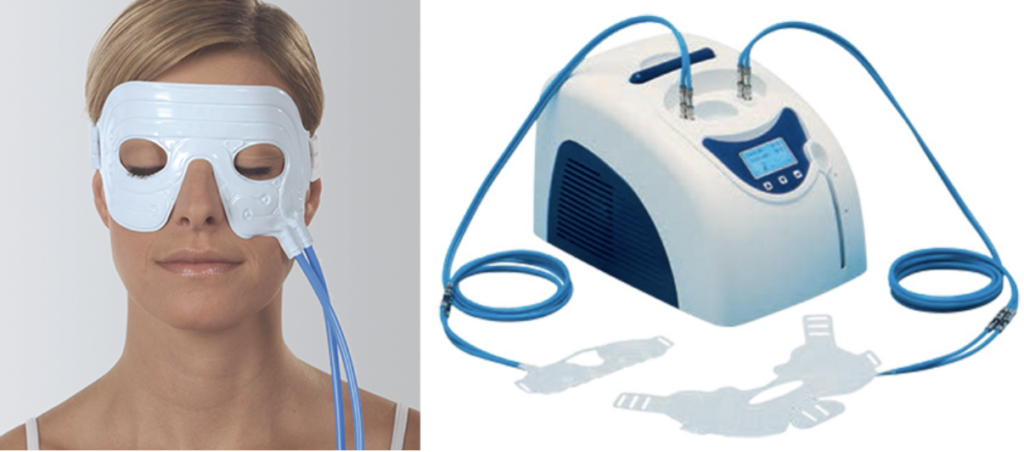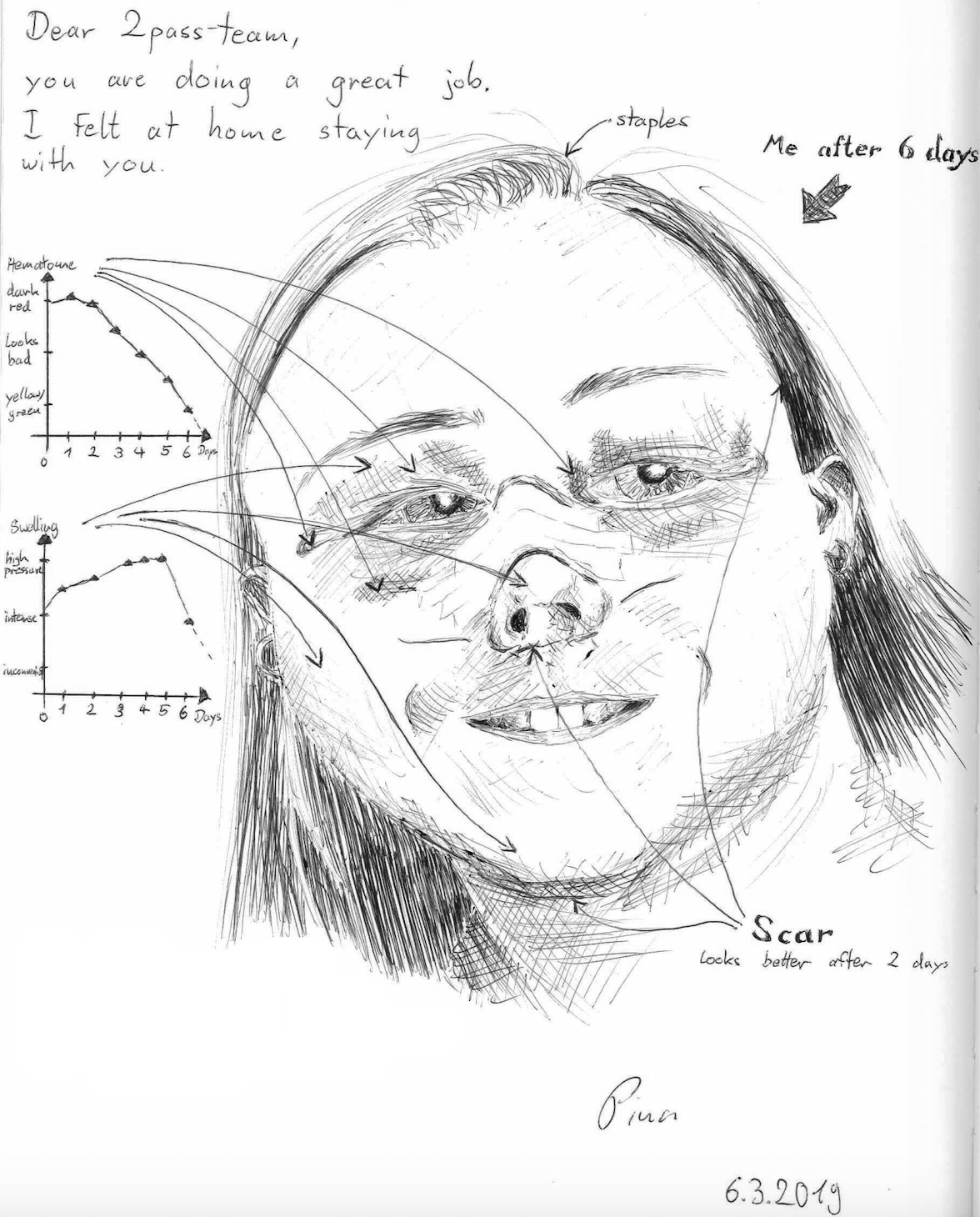What will my recovery after FFS be like?
Table of contents:
After your facial feminization surgery, you will stay at the guesthouse in the clinic for a week so that you can recover and get back on your feet. We will help you with your post-op instructions whenever you so require. During these first days after your operation, we will take care of your every need.
By the time you are ready to return home, you will no longer require any extra care. Should there be any complications following your facial feminization surgery, we will, of course, provide the necessary treatment to rectify the situation – without additional fees for the surgical procedure (only the costs have to be covered).
Things you can expect during your recovery
- Numbness—If Dr Bart van de Ven has carried out a procedure to change the bone structure of your face, you will most likely experience numbness in that area for a certain period of time (for example, the forehead, chin or jaw – depending on the procedure). In any case, you really don’t need to worry because it’s completely normal. This numbness occurs because your skin is detached from your bones during the surgery, which affects the nerves under your skin. So it’s not surprising that it takes a while to fully recover from facial feminization surgery. It’s not unusual for a procedure to have a 12-month recovery period, but after two to five weeks you’ll be ready to get back to work.
- Tightness—Feelings of tightness and warmth, due to swelling, are normal and will subside over time.
- Swelling and bruising—Swelling is on its maximum 2 to 3 days after surgery. Swelling and bruising may be present for up to 2-4 weeks. It may take up to 3-6 months to get an impression of the final results that will be reached after 1 or even 2 years. So patience is required.
- Place and extensiveness— Immediately after surgery the swelling will be mostly in areas of loose connective tissue (cheeks, lips, around eyes). During the first few days, the swelling will move downwards towards the lower jaw and neck due to gravity. Swelling and bruising differ strongly from one person to another and can appear anywhere.
- Bruising may not appear immediately and will gradually fade over the course of several weeks.
- Difficulties breathing through the nose—Most people find it very difficult to breathe through their noses after the rhinoplasty. We will give you some nose drops to open up the nose during your preoperative consultation.
- Trouble eating—Due to swelling that may occur on your lips due to certain procedures, it might be difficult to eat and swallow properly. This swelling will disappear between one to two weeks. Don’t worry, we’ve adapted our food menu for you, and we provide special cups to help with drinking!
The day of your surgery
Right after surgery one may experience the following symptoms. They might linger for a few days:
- General swelling and bruising. Swelling and bruising of the eyes after a forehead reduction and hairline lowering. One might not be able to see well because of it, which can be frightening.
- Double vision could be present for several days or even weeks if the frontal bossing that had to be removed was big.
- Dry mouth and difficulties drinking, especially after a lip lift and lipofilling of the lips since the lips can get so swollen one can’t close their mouth or swallow properly.
- Difficulties breathing through the nose, feeling of an obstruction in the nose, having to breathe through the mouth after a rhinoplasty. The first night after surgery breathing through the nose will be impossible because of the tampons that were inserted. These will be removed the next day by the morning nurse.
- Dizziness, nausea, and vomiting (mostly with jaw and/or chin procedures and rhinoplasty).
The first night might be quite uncomfortable due to these experiences. We have several systems in place to help you sleep, to manage the pain, and to help you with this discomfort. One of these systems is a cooling mask (Hilotherm) that will help you get rid of the swelling around your eyes and your jaw/chin. The cooling effect also works in a soothing way.
 Hilotherm
Hilotherm
Day 1 after surgery
- In the early morning, the night nurse will check up on you, change wound dressings, remove the tampons from the nose, and help you shower and/or wash your hair.
- You can decide to have breakfast then, or at a later time. In case antibiotics need to be taken, it is necessary to eat at least something small to go with it, like yogurt, which will be available to you.
- Since the body is working so hard to recover, the patient will often feel exhausted and go right back to sleep after the nurse did her rounds. Compression stockings need to stay on during this time to avoid blood clots since patients don’t move a lot.
- Body temperature will rise during this stage of recovery. It is called “resorption” fever caused by the body working hard to clean up the internal bleeding. This is nothing to worry about.
- Patients mostly only experience little or no pain since everything still feels numb and insensitive.
- The cooling mask will remain accessible during the first day, making recovery more comfortable.
- Depending on the procedures, one can feel hoarse, have an aching throat, and experience trouble swallowing.
- Often, patients report a fear of sleeping because they are afraid they won’t be able to properly breathe. This can result in a panic attack. Whenever you feel that way, you can call for Elli, Petra or a nurse. They will help you get through it. You will also get sleep medication for the night, to make sure you can have a peaceful night.
Day 2 after surgery
- Prepare to feel exhausted, and not have much – if any – energy.
- Depending on the procedures one had, there might be more swelling than the first day. One might feel worse than day one.
- Since the adrenaline of the surgery is gone, and the patient can’t see any of the final results yet due to bruising and swelling, it is possible one starts to feel depressed. The patient might even start feeling like they have done something they shouldn’t have. This is normal, and these feelings will pass. But be prepared to be very kind to yourself as your body is doing some of the toughest healing jobs. Know that it might take a few weeks before morale rises again.
Day 3 after surgery
- For half of the patients, this is the hardest day. The other half is slowly starting to retrieve some of their energy, starting to feel better and leaving their rooms more often.
- The swelling is starting to subside. Blue bruises start turning yellow and start moving down.
- Patients don’t report pain. Only being uncomfortable.
Day 4 after surgery
- Some patients find the energy to go out for a walk.
- Patients are still swollen and have purple and yellow bruising, but things are getting better and better. We have scarves available in the clinic if you want to cover your face a bit.
Day 5 after surgery
The final control:
- Facemasks are removed.
- Nose molds are removed.
- Stitches or staples are removed.
- Post-op pictures are taken.
- The patient is allowed to leave and go back home. In rare cases, the patient doesn’t feel strong enough yet and decides to stay a bit longer.
Below, you will find a drawing one of our patients made, explaining how her recovery went during the first 6 days!

Practical information, depending on procedures
- You might not be able to wear a wig during the first days of recovery (forehead recontouring, hairline lowering).
- You might not be able to wear contact lenses due to the swelling on and around the eyes; Don’t forget to bring your glasses!
- Caution when chewing, as your upper lip might feel numb.
- Your voice might temporarily sound different due to intubation from general anesthesia, or due to swelling in the area that was worked on around the voice (tracheal shave recovery advice).
Four months after your Facial Feminization Surgery
Four months after your facial feminization surgery, you are expected to visit Dr Bart van de Ven for a free check-up. This appointment is scheduled automatically after booking your facial feminization surgery. It is possible to change the date and time of this appointment. The check-up takes place at the 2pass Clinic in Antwerp, London, Munich or Berlin – depending on Dr Bart van de Ven’s schedule.
What are the possible complications of Facial Feminization Surgery?
If there are any complications, they generally are:
- Infection.
- Each procedure has its own specific risks. Check out the page of the procedure you’re interested in to find more information.
- Feeling down or depressed—surgery is quite impactful, and it appears that many people go through a post-surgical depression about three weeks after their surgery. Don’t worry, you are not alone. We suggest seeking some additional support in case it’s all a bit overwhelming.
We are doing our very best to keep this information up-to-date. In case you see anything that no longer seems accurate, or in case you have a question, please fill out the form below!
